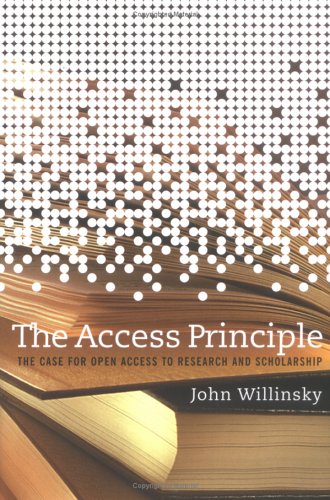By now you know that this year’s Open Access Week at Virginia Tech features a keynote address by John Willinsky, one of the world’s best-known advocates for open access. In addition, in his role as Distinguished Innovator in Residence, he will be visiting many classes and groups on campus for informal conversations. In preparation for his visit, and also to offer a session for the Library Reading Group (this Wednesday at noon in the Boardroom), I’ve been reading (or re-reading) some of his articles on open access, as well as his 2006 book The Access Principle: The Case for Open Access to Research and Scholarship (more on that in Part 2).

John Willinsky (photo credit Peter Searle)
His numerous writings on open access are only a part of his extensive publications list, as you can see from Stanford’s repository, his ORCID profile, and his Google Scholar profile. His articles on open access are impressively wide-ranging, addressing aspects such as ethics, economics, reputation, the developing world, the concept of intellectual property, and technical limitations in the online environment, among others. For our discussion Wednesday in the Reading Group, I’ve chosen The Unacknowledged Convergence of Open Source, Open Access, and Open Science from way back in 2005. Outlined below are a few of his other articles that I’ve read recently.
In The Academic Ethics of Open Access to Research and Scholarship (2011), he and Juan Pablo Alperin consider ethics from the perspective of positive action:
…in which, for example, one goes out of one’s way to help someone- rather than an arena of moral failings… We believe that with the coming of the digital era, the university faces an unprecedented ethical opportunity to act in a positive fashion by reaching out to help others.
Willinsky and Alperin suggest that the rapidly changing publication models prompted by online distribution may present a “limited-time opportunity for ethical action” in which authors could make the extra effort to ensure that research is disseminated widely. In the case of article archiving, authors have the opportunity to greatly reduce the time between completing a paper and making it available to readers.
In Open Access and Academic Reputation (2010) he identifies the paradox that journals remain “indispensable for institutional reputation-setting” while their importance in knowledge exchange is declining, at least in some disciplines, with attention directed to disciplinary repositories such as arXiv.org, for example. Open access journals are improving in reputation through such measures as the impact factor, and authors who publish openly or archive their work stand to benefit from increased readership and citations as well as build reputation more easily on a global scale. Greater access may improve the reputation of research as a whole, as already seen by the “evidence-based” and open data movements. We all need to remember that “the intellectual property at issue in this reputation economy is a sponsored public good.”
Willinsky addresses the problem of access to research in the developing world in his chapter Development and Open Access (PDF) (2013, chapter 26 of Critical Perspectives on International Education, pages 363-378). It’s a long litany of access nightmares that have become worse since the 1970s, caused by “subscription price increases, currency fluctuations, and local economic troubles.”
At the Agricultural Sciences University in Bangalore, which I visited in 2003, nearly half the journal subscriptions had been canceled during the preceding decade…
In addition to his own experiences, the chapter refers to the literature of global access problems, which are somewhat mitigated by efforts such as INASP and HINARI. Often overlooked is the ability of scholars in the developing world to get published, made more difficult because it is so hard to keep up with current literature.
What this means is that scholars everywhere need to question their assumptions about what constitutes an adequate circulation of their and others’ work.
In addition to his advocacy for open access, Willinsky has worked to create open source software for open access journals. In 1998 he founded the Public Knowledge Project to do just that (the University Libraries uses PKP’s Open Journal Systems and Open Conference Systems software). PKP also created software for book publishing, and in his 2009 article Toward the Design of an Open Monograph Press, Willinsky described the software, the workflows it enables, and how it can help address the difficulties of publishing a scholarly monograph.
In a similar vein, he and two co-authors describe potential improvements to the most common article format in Refurbishing the Camelot of Scholarship: How to Improve the Digital Contribution of the PDF Research Article. Among the suggestions are improvements in legibility, linkable references, annotation, and metadata, with numerous opportunities for contribution by repositories.
Hopefully I’ve provided a decent overview of John Willinsky’s writings on open access, and perhaps it can serve as a source of conversation during his visit. In Part 2 I’ll discuss The Access Principle.
 John Willinsky’s The Access Principle: The Case for Open Access to Research and Scholarship (2006) was the first book published on open access (that I am aware of, anyway). I remember reading it sometime around 2008 and it’s certainly had a profound influence on my thinking about the dissemination of research.
John Willinsky’s The Access Principle: The Case for Open Access to Research and Scholarship (2006) was the first book published on open access (that I am aware of, anyway). I remember reading it sometime around 2008 and it’s certainly had a profound influence on my thinking about the dissemination of research.